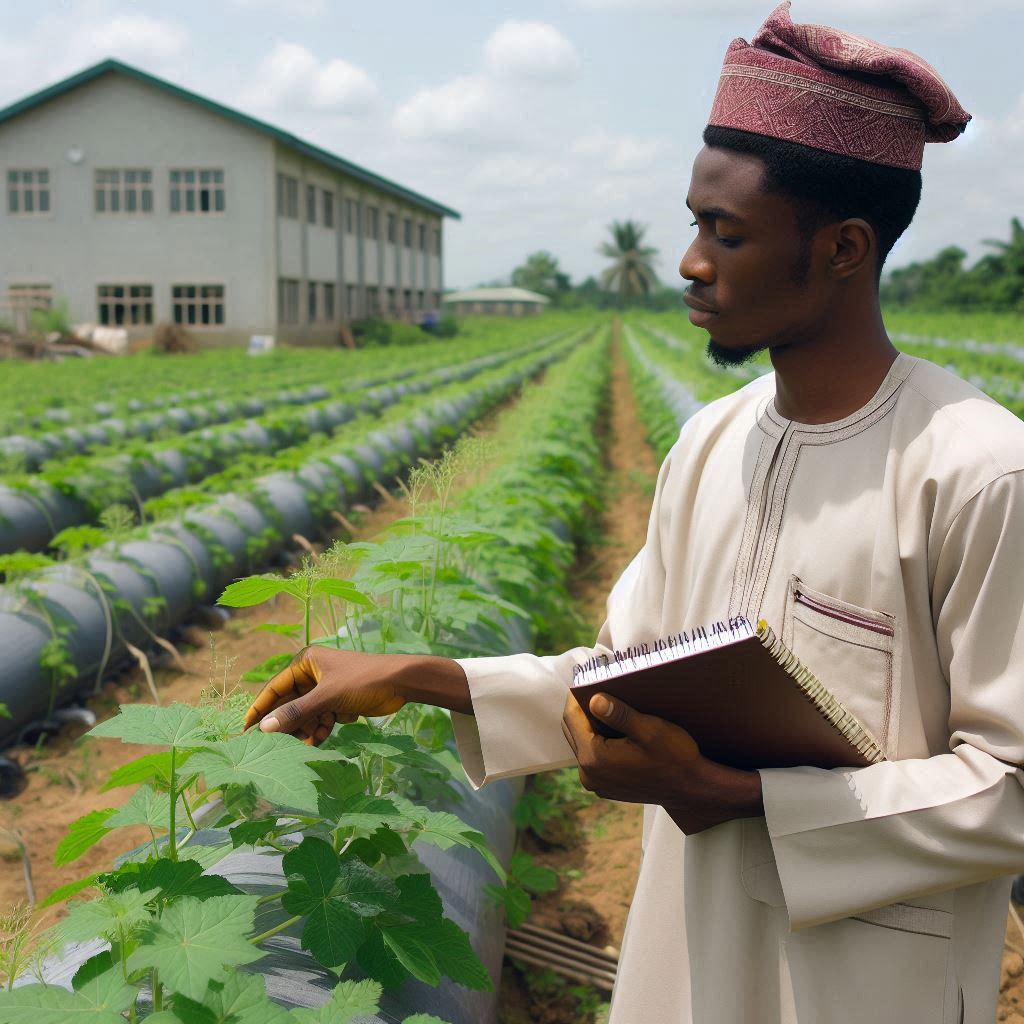Introduction
Definition of Agricultural Science Workshops
Agricultural science workshops are specialized training sessions. These sessions focus on enhancing teachers’ knowledge and skills in agricultural practices.
They offer hands-on learning experiences and practical knowledge. Workshops cover a wide range of topics in agricultural science.
These topics include modern farming techniques, sustainable agriculture, and technological advancements in farming.
Teachers gain valuable insights through these workshops. They also learn innovative teaching methods to apply in their classrooms.
Importance of Workshops for Nigerian Teachers
Agricultural science workshops are crucial for Nigerian teachers. They provide up-to-date information on current agricultural practices.
These workshops bridge the knowledge gap in agricultural education. Teachers equipped with modern agricultural knowledge can effectively educate students.
This education prepares students for future careers in agriculture. It also fosters a deeper understanding of sustainable farming practices.
Workshops enhance teachers’ confidence and competence in the subject matter. This confidence translates into improved teaching quality and student engagement.
Moreover, these workshops contribute to the overall development of the agricultural sector in Nigeria.
Overview of the Current State of Agricultural Education in Nigeria
The current state of agricultural education in Nigeria faces several challenges. Many schools lack adequate resources and facilities. Teachers often have limited access to updated materials and training.
Consequently, agricultural education remains outdated and less effective. There is a noticeable gap between theory and practical application.
Students rarely get hands-on experience in modern farming techniques. This lack of practical exposure hampers their understanding and interest in agriculture.
Moreover, the curriculum often fails to address current agricultural trends. Topics like sustainable agriculture and new technologies are inadequately covered.
This gap leaves students ill-prepared for modern agricultural practices. Furthermore, there is a shortage of trained agricultural science teachers.
Many teachers lack the necessary skills and knowledge to teach the subject effectively. This shortage further impacts the quality of agricultural education.
Despite these challenges, there are efforts to improve the situation. Government initiatives and private organizations are working to enhance agricultural education.
They aim to provide better training and resources for teachers. Agricultural science workshops play a significant role in these efforts.
They offer an opportunity to update and improve teachers’ knowledge and skills. By attending these workshops, teachers can bring new insights into the classroom.
This improvement can lead to better student outcomes and a more robust agricultural sector.
In fact, agricultural science workshops are vital for the advancement of agricultural education in Nigeria. They equip teachers with the necessary tools to educate the next generation of farmers.
By addressing the current challenges, these workshops can significantly improve the state of agricultural education.
Through continuous learning and adaptation, Nigerian teachers can drive the agricultural sector forward. This progress will ultimately benefit the entire nation, promoting sustainable and innovative farming practices.
Objectives of Agricultural Science Workshops
Agricultural science workshops for Nigerian teachers aim to achieve several key objectives.
These workshops enhance teachers’ knowledge and skills, provide innovative teaching methods, and promote technology integration in agricultural education. Let’s delve deeper into these objectives.
Enhancing Teachers’ Knowledge and Skills in Agricultural Science
One of the primary objectives is to enhance teachers’ knowledge and skills in agricultural science. These workshops offer comprehensive training on modern agricultural practices and techniques.
Teachers learn about sustainable farming methods, crop management, and soil science. The workshops also cover livestock management, emphasizing animal health and nutrition.
By updating teachers’ knowledge, these workshops ensure that educators can provide students with current and relevant information. Improved knowledge leads to better teaching outcomes and more engaged students.
Providing Teachers with Innovative Teaching Methods
Another crucial objective is to provide teachers with innovative teaching methods. Agricultural science is a dynamic field that requires creative approaches to teaching.
Workshops introduce teachers to hands-on learning activities and interactive lessons. Teachers learn how to create engaging classroom experiences that stimulate students’ interest.
They explore project-based learning, where students work on real-life agricultural projects. This method fosters critical thinking and problem-solving skills.
Additionally, teachers learn how to use case studies and field trips to enrich the learning process. By adopting these innovative methods, teachers can make agricultural science more accessible and exciting for students.
Promoting the Integration of Technology in Agricultural Education
Promoting the integration of technology in agricultural education is another essential objective. Modern agriculture relies heavily on technology for efficiency and productivity.
Workshops teach teachers how to incorporate technology into their lessons effectively. They learn about precision farming tools, such as GPS and drones, which are transforming agriculture.
Teachers also discover various agricultural apps and software that can aid in teaching and farm management.
The workshops emphasize the importance of teaching students about technological advancements in agriculture. By integrating technology, teachers can prepare students for the future of farming.
Generally, Agricultural science workshops for Nigerian teachers play a vital role in advancing agricultural education.
These workshops enhance teachers’ knowledge and skills, ensuring they are well-equipped to teach contemporary agricultural practices.
Providing innovative teaching methods helps make agricultural science engaging and effective. Promoting technology integration prepares students for modern agricultural challenges.
Together, these objectives contribute to a robust and dynamic agricultural education system in Nigeria. By focusing on these goals, the workshops empower teachers to inspire the next generation of agricultural professionals.
Read: Nigerian Curriculum Studies Academic Journals
Topics Covered in Agricultural Science Workshops
In the agricultural science workshops for Nigerian teachers, various topics are covered to enhance their knowledge and skills in the field.
These workshops aim to equip teachers with the necessary information to educate students about agriculture and related areas. The topics covered include:
Let’s delve deeper into each of these topics to understand their importance in the context of agricultural science education.
Crop Production and Management
Crop production and management are essential components of agricultural science. Teachers learn about different crop varieties, cultivation techniques, pest management, and soil fertility.
They understand the importance of crop rotation, intercropping, and the use of organic farming methods.
By gaining knowledge in crop production and management, teachers are better equipped to teach students about sustainable agricultural practices.
Animal Husbandry and Veterinary Science
Animal husbandry and veterinary science are crucial aspects of agriculture. Teachers in the workshops learn about livestock management, breeding practices, animal nutrition, and disease prevention.
They understand the importance of proper care and management of animals to ensure their health and productivity.
By gaining knowledge in animal husbandry and veterinary science, teachers can educate students about the ethical and sustainable practices in animal agriculture.
Agribusiness and Entrepreneurship
Agribusiness and entrepreneurship are vital for the economic development of the agricultural sector. Teachers are introduced to the concepts of agribusiness, marketing strategies, value chain analysis, and opportunities in the agricultural market.
They learn about the importance of entrepreneurship in agriculture and the potential for income generation.
By gaining knowledge in agribusiness and entrepreneurship, teachers can inspire students to explore career opportunities in the agricultural sector.
Sustainable Agriculture Practices
Sustainable agriculture practices are crucial for the preservation of the environment and natural resources. Teachers learn about conservation agriculture, organic farming, water management, and climate-smart practices.
They understand the importance of sustainable agriculture in ensuring food security and environmental sustainability.
By gaining knowledge in sustainable agriculture practices, teachers can instill in students the importance of responsible farming practices for a better future.
In general, the topics covered in agricultural science workshops for Nigerian teachers are diverse and comprehensive. These workshops play a crucial role in enhancing the knowledge and skills of teachers in various aspects of agriculture.
By equipping teachers with the necessary information, they can educate and inspire students to become future leaders in sustainable agriculture and agribusiness.
Read: Implementing Tech in Nigerian Classrooms
Benefits of Attending Agricultural Science Workshops
Attending agricultural science workshops can provide numerous benefits for teachers in Nigeria. These workshops offer a platform for professional development, networking opportunities, access to valuable resources, and can lead to improved student outcomes.
Professional Development Opportunities
One of the key benefits of attending agricultural science workshops is the opportunity for professional growth and development.
These workshops often feature experts in the field who share their knowledge and insights with participants.
Teachers can learn about the latest trends and research in agricultural science, as well as innovative teaching methods and strategies.
By attending these workshops, teachers can enhance their skills and stay current with best practices in the field. This can ultimately benefit their students by ensuring that they receive a high-quality education in agricultural science.
Networking with Educators
Another advantage of attending agricultural science workshops is the opportunity to network with other educators in the field.
Networking can help teachers build connections with like-minded professionals, share ideas and experiences, and collaborate on projects or initiatives.
By building a network of colleagues in the agricultural science community, teachers can enhance their own knowledge and expertise.
They can also gain access to a supportive community of peers who can provide guidance and support throughout their teaching careers.
Access to Resources and Materials
Agricultural science workshops often provide teachers with access to a wealth of resources and materials that they can use in their classrooms.
These resources may include lesson plans, activities, experiments, and other educational materials that can enhance the learning experience for students.
By attending workshops, teachers can discover new tools and resources that can help engage students and make learning more interactive and enjoyable.
These materials can also help teachers save time in lesson planning and preparation, allowing them to focus on delivering high-quality instruction to their students.
Improved Student Engagement and Performance
One of the most significant benefits of attending agricultural science workshops is the potential for improved student engagement and performance.
By implementing new teaching strategies and using innovative resources, teachers can create a more dynamic and interactive learning environment for their students.
Engaged students are more likely to participate actively in class, ask questions, and retain information. This can lead to improved academic performance and a deeper understanding of agricultural science concepts.
Ultimately, attending workshops can help teachers inspire a love of learning in their students and set them up for success in their academic pursuits.
In essence, attending agricultural science workshops offers a range of benefits for teachers in Nigeria.
From professional development opportunities to networking with other educators, access to valuable resources, and improved student outcomes, these workshops can have a significant impact on teaching practice and student learning.
Teachers who take advantage of these opportunities can enhance their knowledge and skills, ultimately benefiting their students and the broader agricultural science community.
Read: Curriculum Studies Student Resources in Nigeria

Challenges and Solutions in Organizing Agricultural Science Workshops
Limited Funding and Resources
Organizing agricultural science workshops in Nigeria faces significant financial constraints. Securing funds for venue, materials, and logistics is challenging.
Limited resources often result in subpar workshop experiences for teachers. Without adequate funding, it’s difficult to attract high-quality facilitators or invest in necessary teaching aids.
Therefore, financial limitations are a major hurdle that needs addressing for effective workshops.
Lack of Awareness and Participation from Teachers
A lack of awareness about the importance of agricultural science workshops hampers participation. Many teachers remain uninformed about the benefits these workshops offer.
Additionally, some teachers might not see the immediate value in attending. This lack of awareness leads to low turnout and engagement. Consequently, the impact of the workshops diminishes if teachers do not fully participate.
Strategies for Securing Sponsorships and Partnerships
Securing sponsorships and partnerships can alleviate funding issues. Engaging local businesses and agricultural companies can provide necessary financial support.
Creating compelling proposals that highlight mutual benefits helps in gaining sponsors. Forming partnerships with universities and agricultural institutions can also provide resources and expertise.
These collaborations are essential in creating sustainable and impactful workshops.
Utilizing Online Workshop Options
Online workshops can overcome geographical and logistical barriers. They allow for a wider reach, enabling teachers from remote areas to participate.
Online platforms can be cost-effective, reducing the need for physical resources.
Digital materials can be easily distributed and accessed. Thus, online workshops are a viable solution for expanding the reach and impact of agricultural science education.
In review, Organizing effective agricultural science workshops in Nigeria is fraught with challenges. Limited funding and resources can hinder the quality and reach of these events.
Lack of awareness among teachers reduces participation, affecting the overall success of the workshops. However, strategic sponsorships and partnerships can provide the necessary support.
Additionally, online workshops offer a practical solution to reach more teachers efficiently.
By addressing these challenges, we can enhance agricultural science education and empower Nigerian teachers to impart valuable knowledge to their students.
Read: Role of Teachers in Curriculum Studies Nigeria
Success Stories from Previous Agricultural Science Workshops
Teachers who have attended the Agricultural Science workshops in Nigeria have shared inspiring success stories highlighting the impact of these workshops on their professional development and classroom practices.
These testimonials serve as a testament to the effectiveness of the workshops in enhancing teaching and learning in the field of agricultural science.
Testimonials from Teachers Who Have Attended Workshops
During the workshops, teachers were able to learn new teaching methodologies, practical skills, and innovative approaches to delivering agricultural science concepts in a more engaging and effective manner.
They expressed how attending these workshops has reinvigorated their passion for teaching and has equipped them with the necessary tools to inspire and educate their students.
Impact of Workshops on Classroom Teaching and Student Learning
Teachers reported a significant improvement in their classroom teaching practices after implementing the strategies learned during the workshops.
They observed higher levels of student engagement, increased understanding of agricultural science concepts, and improved academic performance among their students.
The workshops have undoubtedly contributed to creating a more conducive learning environment for both teachers and students.
Transform Your Career with Expert Guidance
Get personalized mentorship consulting that’s tailored to your unique path. Our expert advice is actionable and exclusive.
Get StartedCollaborations with Government Agencies, NGOs, and Industry Partners
The success of the Agricultural Science workshops in Nigeria can also be attributed to the collaborations established with various stakeholders, including government agencies, non-governmental organizations (NGOs), and industry partners.
These collaborations have enabled the workshops to access additional resources, expertise, and support, enhancing the overall quality and impact of the workshops.
Government agencies have provided logistical support and funding to ensure the sustainability of the workshops. NGOs have contributed valuable insights and resources to enrich the workshop curriculum and activities.
Industry partners have supplied materials, equipment, and expertise to facilitate hands-on learning experiences for teachers and students.
In a nutshell, the success stories from previous Agricultural Science workshops in Nigeria showcase the transformative impact of these workshops on teachers, students, and the broader community.
Through innovative teaching methods, enhanced classroom practices, and strategic collaborations, these workshops have played a pivotal role in advancing agricultural education and promoting sustainable development in Nigeria.
Conclusion
Recap of the Importance of Agricultural Science Workshops for Nigerian Teachers
Agricultural science workshops for Nigerian teachers are crucial for modernizing agricultural education. These workshops equip teachers with the latest agricultural techniques and knowledge.
Teachers then pass this valuable information to students, enhancing their agricultural literacy. Well-informed students can apply modern agricultural practices in their communities.
Thus, workshops directly contribute to improving agricultural productivity and food security.
Teachers gain hands-on experience and insights into sustainable farming practices. This knowledge empowers them to teach more effectively and inspire future generations.
Encouraging Educators to Participate in Upcoming Workshops
We strongly encourage educators to participate in upcoming agricultural science workshops. Participation enhances their teaching skills and broadens their agricultural knowledge.
Workshops offer opportunities for professional development and networking with other educators. Teachers can share ideas and experiences, fostering a collaborative learning environment.
By attending, they stay updated on the latest advancements in agricultural science. This involvement is critical for staying relevant in a rapidly evolving field.
Moreover, active participation demonstrates a commitment to continuous improvement and excellence in teaching.
Providing Information on How Teachers Can Get Involved or Support Workshop Initiatives
Getting involved in agricultural science workshops is straightforward. Teachers can start by registering for workshops offered by reputable organizations.
Information about upcoming workshops is often available online or through educational institutions. Teachers should contact local agricultural extension offices for details on workshops and training programs.
Additionally, educators can join professional associations related to agricultural education. These associations often organize workshops and provide resources for members.
Teachers can also advocate for these workshops within their schools and communities. Encouraging colleagues and students to support agricultural education initiatives is crucial.
Teachers can seek funding or sponsorship opportunities to attend workshops. Many organizations and government programs offer grants for professional development.
Educators should explore partnerships with local agricultural businesses and NGOs. These partnerships can provide additional resources and support for workshop participation.
By actively engaging with these opportunities, teachers can make a significant impact. Supporting workshop initiatives is also possible through volunteering and community involvement.
Educators can volunteer to help organize and promote workshops. They can also offer to mentor new teachers and share their knowledge.
Final Thoughts
Agricultural science workshops are vital for advancing education and agricultural practices in Nigeria. Teachers play a pivotal role in this transformation by participating in and supporting these workshops.
Through continuous learning and professional development, educators can significantly enhance agricultural education. This, in turn, benefits students, communities, and the nation as a whole.
Let’s work together to ensure the success of these initiatives and create a brighter future for Nigerian agriculture.




